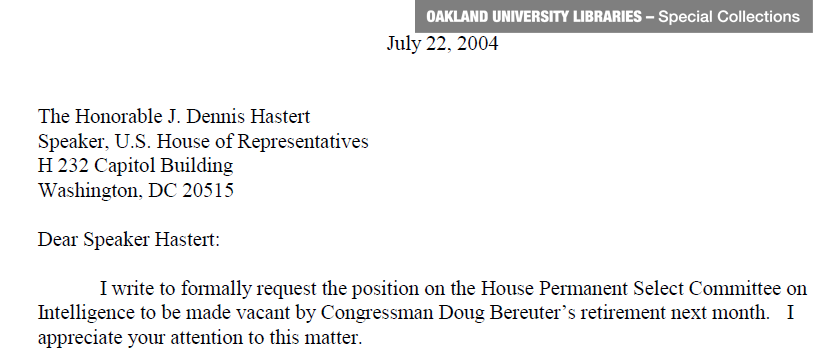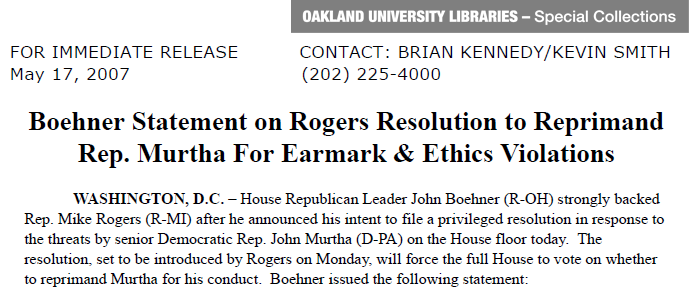People
President George W. Bush
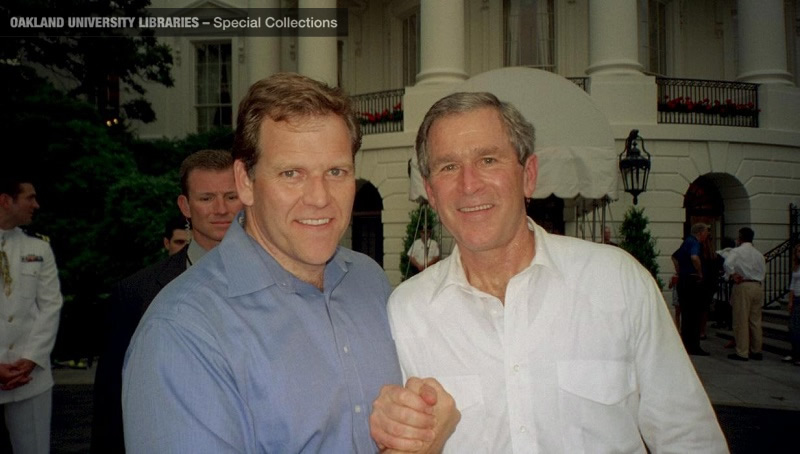 George W. Bush was sworn in as the 43rd President of the United States in January of 2001 at the same time that Mike Rogers began his first term in the U.S. House of Representatives. Rogers and Bush saw eye to eye almost immediately. Rogers presented his Michigan Education Savings Account program to Bush and won his support for making such accounts federally exempt in June of 2001. “I want to commend Congressman Mike Rogers for the role he played,” Bush said. “From our initial meeting at the White House in January to the tax bill’s recent passage, Mike made it clear that his top priority was tax-free college savings accounts” (Livingston County Daily Press & Argus, June 2001). Simultaneously, Rogers voted for Bush’s 2001 tax cuts, arguing that they were needed in his district to slow the economic downturn and return the United States “to a positive growth pattern that creates jobs.” After the attacks of September 11, 2001, Rogers became a foreign policy hawk, frequently asserting the need to take action against global terrorism and the regimes he believed supported it. While he initially opposed sending U.S. troops to Iraq, he came to support Bush’s military intervention in both Afghanistan and Iraq. When Democrats in Congress called for a gradual withdrawal from Afghanistan in Bush’s second term, Rogers dismissed them as defeatists. Rogers advocated for more aggressive foreign policy regarding Iran and North Korea, as well.
George W. Bush was sworn in as the 43rd President of the United States in January of 2001 at the same time that Mike Rogers began his first term in the U.S. House of Representatives. Rogers and Bush saw eye to eye almost immediately. Rogers presented his Michigan Education Savings Account program to Bush and won his support for making such accounts federally exempt in June of 2001. “I want to commend Congressman Mike Rogers for the role he played,” Bush said. “From our initial meeting at the White House in January to the tax bill’s recent passage, Mike made it clear that his top priority was tax-free college savings accounts” (Livingston County Daily Press & Argus, June 2001). Simultaneously, Rogers voted for Bush’s 2001 tax cuts, arguing that they were needed in his district to slow the economic downturn and return the United States “to a positive growth pattern that creates jobs.” After the attacks of September 11, 2001, Rogers became a foreign policy hawk, frequently asserting the need to take action against global terrorism and the regimes he believed supported it. While he initially opposed sending U.S. troops to Iraq, he came to support Bush’s military intervention in both Afghanistan and Iraq. When Democrats in Congress called for a gradual withdrawal from Afghanistan in Bush’s second term, Rogers dismissed them as defeatists. Rogers advocated for more aggressive foreign policy regarding Iran and North Korea, as well.
Governor John Engler
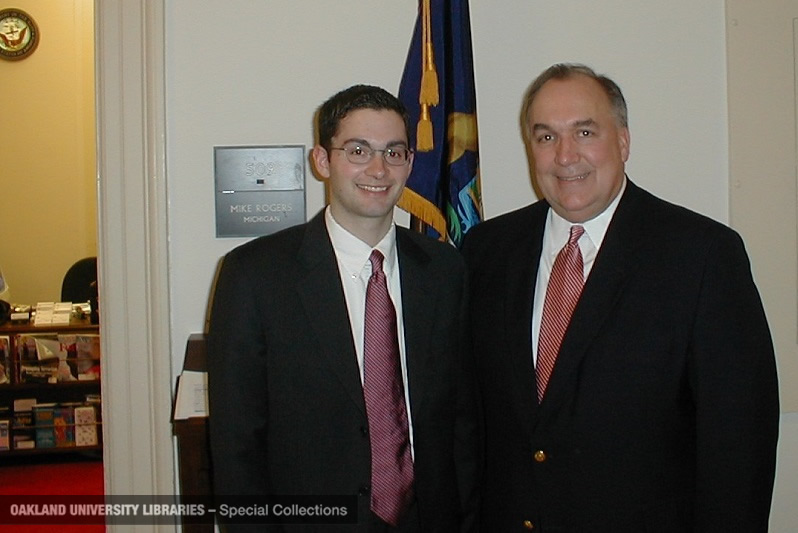
Governor Engler in front of Mike Rogers' office with assistant Andy Keiser.
John Engler began his first term as Michigan’s governor in 1991 and served the maximum three terms. He was governor for the entirety of Mike Rogers’ tenure in the Michigan legislature. Rogers and Engler shared a legislative agenda, both arguing for educational reform, deregulation, and tax cuts. In particular, Rogers and Engler worked together to pass education initiatives and Internet crime legislation. Engler, Rogers claimed, had “a solid commitment to have the best public education system in the world” (Michigan Daily, January 21, 2000). When Bob Dole ran for president in 1996, Rogers went so far as to suggest that Engler should be Dole’s vice-presidential nominee, holding that Engler “puts that trust factor back in the national scene”; Dole eventually chose Jack Kemp instead (Argus Press, July 31, 1996). In 1999, Rogers attributed Michigan’s economic resurgence to Engler and his leadership: “Michigan’s phenomenal turnaround can be attributed to the leadership of Governor John Engler and the Republican legislators… [who] made it possible for job providers and families to keep more of their own money, to create new jobs, broaden educational opportunity with parental choice and school accountability, and make our communities safe by getting tough on criminals,” he wrote (8th District Newsletter, Setp. 14, 1999).
Senator John McCain
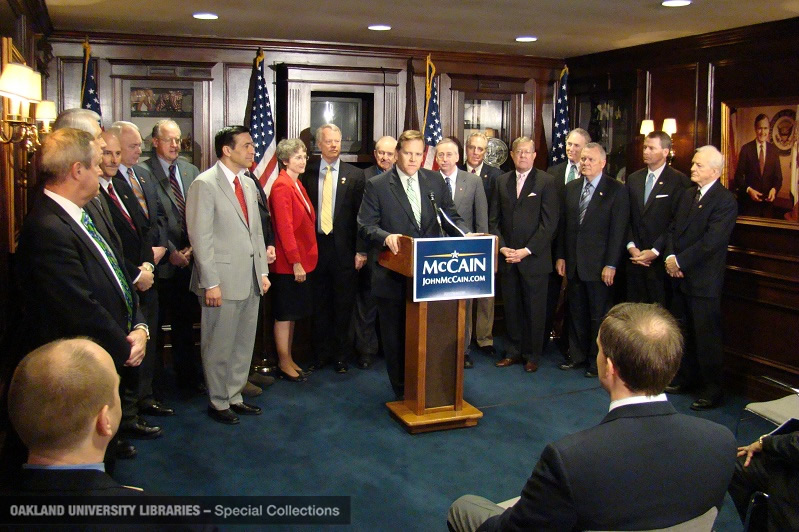
Mike Rogers speaking in support of Senator McCain, 2008.
In the Republican primary for the 2000 Presidential Election, Rogers was initially indecisive with his support. While he first joined with John Engler to back George W. Bush, he soon claimed disappointment in Bush’s failure to address “education, compassionate conservatism and outreach” in his program (Wall Street Journal, Feb. 17, 2000). When John McCain’s candidacy momentarily picked up steam in February of 2000, Rogers said that he would have no objection to John McCain as Republican nominee. McCain eventually campaigned for Rogers in the 8th District in September of 2000, and Rogers suggested to the press that he would support McCain’s campaign finance reform legislation (which became the McCain-Feingold bill in 2001). However, Rogers had a change of heart in 2001, voting against the Shays-Meehan bill (the House equivalent of McCain-Feingold), leading to tensions with McCain and his allies. Nevertheless, Rogers enthusiastically endorsed McCain for President of the United States in 2008.
Senator Debbie Stabenow
Mike Rogers letter to Michigan Senators Stabenow and Levin (2002).
Debbie Stabenow was Michigan’s junior senator to the U.S. Senate from 2001 to 2014 (she became the senior senator upon the retirement of Senator Carl Levin in 2015). In some ways, her career dictated the course of Rogers’ own. Stabenow, a Democrat, had been the representative of Michigan’s 8th U.S. House district between 1997 and 2001. She decided to run for the U.S. Senate in the 2000 election, leaving the 8th District open. This allowed Mike Rogers to run for her former seat against Dianne Byrum, who lacked Stabenow’s name recognition. Though Rogers only won that election by a little over one-hundred votes, he would have had a still tougher time against the popular Stabenow, who had defeated Republican 8th District incumbent Dick Chrysler in 1996 and would go on to defeat Senator Spencer Abraham in 2000 in what has been characterized as a remarkably negative campaign for both parties.
While Stabenow and Rogers were in different houses of the U.S. Congress, they found numerous opportunities to clash on issues. Michigan, the only state that continued to allow gas and oil wells in the Great Lakes, had been under a temporary ban for new oil and gas drilling. But it was announced in February of 2001 that new wells would soon be allowed. In June of 2001, Stabenow introduced a bill to ban oil and gas drilling on the Great Lakes. Rogers fought for his own legislation instead, which would have “encouraged” states to ban offshore drilling but allowed it from the federal level. Stabenow’s bill ultimately became law in 2002. In 2003, Stabenow accused Rogers and his House colleague (and fellow Michigander) Candice Miller of attempting to defeat a different environment bill she authored, which would have regulated the importation of Canadian trash into Michigan. Again, Rogers introduced a competing environmental bill, this time contending that Stabenow’s bill did not go far enough. Neither Canadian trash bill ended up becoming a law.
Representative Tom DeLay
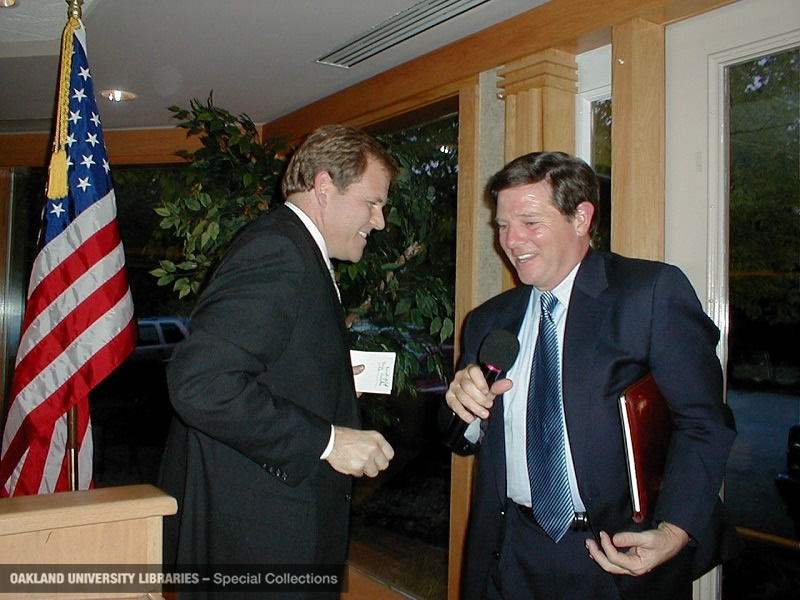
Mike Rogers with Tom DeLay in 2002.
Tom DeLay, the Republican representative of Texas’ 22nd district, was the House Majority Whip when Rogers arrived in Congress, but had been elevated to House Majority Leader in 2003. After accepting an invitation to Rogers’ swearing-in ceremony in 2001, DeLay – widely considered the power behind Dennis Hastert’s speakership due to his fundraising acumen – made Rogers a part of his fifty person leadership team in the House. Rogers was made one of twelve deputy whips by DeLay, who credited Rogers’ “drive, personality, and state Senate experience” for his selection. Rogers, DeLay said, was “gregarious and always ready with a quip” and “has been willing to put in late hours on the floor as well as at conferences, workshops, and other events held by GOP constituents to build relationships.” (USA Today, August 9, 2001) Rogers was also enlisted in DeLay’s so-called “K-Street” program, which involved outreach by congressional representatives toward business leaders in order to build relationships for future Republican fundraising initiatives. After DeLay resigned in 2005, Rogers sought the position of House Majority Whip left by Roy Blunt. However, John Boehner defeated Blunt in the Majority Leader election in the U.S. House, leaving Blunt to continue as Whip.
Speaker Dennis Hastert
Mike Rogers letter to Speaker Hastert requesting appointment to the House Permanent Select Committee on Intelligence (2004).
Dennis Hastert, the 51st Speaker of the United States House of Representatives, was the most powerful member of Congress and the third most senior Republican in the nation during the first half of Rogers’ U.S. House career. Hastert encouraged Rogers to take an active role in the nation’s foreign policy, sending Rogers on fact-finding visits to Iraq seven times between 2001 and 2005. “Mike Rogers’ background and his experience make him a valuable addition to this committee dealing with important issues related to the security of our nation at a crucial time in the war on terrorism,” Hastert said (USA Today, January 27, 2005). Rogers took to the task with enthusiasm. In 2004, he ruled that Iraq was already prepared to govern itself after Operation Iraqi Freedom, asserting that “the transfer of power will be mostly symbolic because most of Iraq’s government is already under Iraqi control” (USA Today, June 22, 2004).
Representative John Murtha
Rogers had a contentious relationship with Murtha, a Democratic Representative of Pennsylvania who chaired the House Appropriations Defense Subcommittee between 2008 and 2010. In 2008, Rogers attempted to eliminate funding in the 2008 Intelligence Act for a drug intelligence center in Murtha’s district. Rogers argued that appropriation was “an expensive and duplicative use of scarce federal drug enforcement resources.” In responses, Murtha reportedly told Roger, “I hope you don’t have any earmarks in the defense appropriations bills because they are gone and you will not get any earmarks now and forever.” Rogers then asked the House to reprimand Murtha for his outburst, introducing a resolution to that effect. House Speaker John Boehner claimed Murtha’s statements to Rogers outlined “a blatant abuse of power…” (ABC News, May 18 2007) A vote along party lines resulted in Murtha’s exculpation, but Murtha apologized to Rogers the next day. Rogers’ press secretary asserted that while Rogers accepted the apology, he was “truly hopeful that this whole episode will change the way Congress spends the American taxpayers’ money” (The Hill, May 24, 2007) .
President Barack Obama
Democratic presidential nominee Barack Obama was elected President of the United States in November of 2008, soundly defeating Republican nominee John McCain. Rogers began to criticize the 44th President almost immediately. Rogers claimed that President Obama’s tax policies would hurt the middle class. “This guy is completely out of touch with the average Michigan family,” argued Rogers. (Associated Press, June 16, 2008) In 2010, Rogers voted in line with Obama’s agenda a mere 31 percent of the time. He blamed Obama for Michigan’s high unemployment, and expressed “very strong concerns” about the deficit spending of the Democrat-led Congress (CNN, September 23, 2012). Rogers was particularly opposed to the Affordable Care Act, known colloquially as “Obamacare,” asserting that it made healthcare more expensive for the many to the benefit of the few. “So we’ve broken the system to help a few,” he argued, “Nobody would fix a problem that way” (Meet the Press, December 1, 2013). .
But Rogers’ disagreements with Obama did not stop in the economic sphere. As he took on increasing responsibilities regarding intelligence oversight after 2010, Rogers became outspoken about the president’s perceived shortcomings in foreign policy. In 2014, when the Islamic State was on the brink of conquering all of Iraq while Russia destabilized Ukraine through political and military interventions, Rogers blamed the unsettled global climate upon Obama. The President’s refusal to intervene in those matters, Rogers said, “shows… that his foreign policy is in absolute free fall. If you look at China, if you look at ISIS, you look at Russia, you look at Iran, North Korea, we have a serious host of problems presenting itself. Our traditional allies are now standing up and saying maybe America is not the best ones to lead us through the troubles” (Newsmax, August 31, 2014).
Speaker John Boehner
Press release from House Speaker John Boehner supporting Rogers for his resolution against Congressman Murtha (2007).
John Boehner was a Republican member of the U.S. House of Representatives from Ohio’s 8th District and a steady presence in the Republican leadership beginning in 2006 when he became House Majority Leader. He was the 53rd Speaker of the House, and therefore the highest ranking Republican politician in the nation, from January 2011 until his resignation in October 2015. In 2010, Boehner appointed Mike Rogers chairman of the House Permanent Subcommittee on Intelligence, which oversaw the entirety of the American intelligence apparatus. “As a former FBI agent and army officer, Mike Rogers’ experience and expertise has proven valuable throughout his tenure on the Intelligence Committee,” Boehner announced (The Hill, December 15, 2010).
Rogers and Boehner had a close relationship characterized by mutual respect and an interest in cooperating with Democrats in order to keep Congress functioning. Both began to face criticism from their Republican colleagues in the 2010s, as the Tea Party movement grew in strength and its advocates insisted that elected Republicans conform more stringently to ideologically conservative values in their positions. Whereas Boehner was attacked by Tea Party members for his acquiescence to tax increases in the budget for 2014, Rogers was lambasted for his committee’s failure to uncover evidence of an Obama administration plot in regard to the Benghazi attacks. Rogers was, therefore, sympathetic when opposition from within his own party led Boehner to resign from the House in September of 2015. “When they [i.e., the Republican Party] go back and look at his record,” Rogers said, “I think they’re going to find that he was more than supportive of a conservative issue. And to say that John Boehner didn't govern as a conservative I think is probably inaccurate… Remember, it is a brutal job when everything is working well. It’s not even close to being remotely interesting when it’s – when you can’t get your own caucus to agree on policies” (NPR, September 25, 2015).
Representative C. A. “Dutch” Ruppersberger
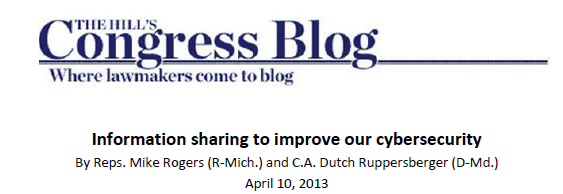 Upon his appointment as chairperson of the House Permanent Select Committee on Intelligence from John Boehner in 2010, Rogers aimed to ensure that the committee did not fall into the same obstructionist legislative morass as the rest of Congress. His chief ally in this endeavor was Maryland Democrat C. A. “Dutch” Ruppersberger, a veteran Congressman appointed to the Committee in 2002. Ruppersberger had a reputation in his state as a consensus-builder. The two connected almost immediately, bonding over a shared perception that elements of the intelligence apparatus had grown too big, and the Intelligence Committee too partisan (National Journal Daily PM, January 28, 2011). “We agreed that the committee had become degraded over time in its ability to conduct serious oversight,” Rogers said in retrospect. For his part, Ruppersberger noted that “We may disagree on a few issues here or there, but we plan to work together in a bipartisan way” (CQ Today, March 15, 2011). While previous iterations of the Intelligence Committee had been characterized as “one of the meanest snake pits in Congress, a place where members were so busy sniping at each other they failed to provide effective oversight of the intelligence community,” Rogers and Ruppersberger succeeded in passing the first of several annual intelligence authorization bills for the first time in five years in 2011. They also shepherded into law a bipartisan Cyber Intelligence and Sharing Protection Act, which endeavored to help American businesses protect their computer networks from cyber attacks. In 2015, Rogers and Ruppersberger jointly received the William Oliver Baker Award from the National Security Alliance, in honor to their nonpartisan “pragmatic approach to intelligence oversight” (Targeted News Service, June 6, 2015).
Upon his appointment as chairperson of the House Permanent Select Committee on Intelligence from John Boehner in 2010, Rogers aimed to ensure that the committee did not fall into the same obstructionist legislative morass as the rest of Congress. His chief ally in this endeavor was Maryland Democrat C. A. “Dutch” Ruppersberger, a veteran Congressman appointed to the Committee in 2002. Ruppersberger had a reputation in his state as a consensus-builder. The two connected almost immediately, bonding over a shared perception that elements of the intelligence apparatus had grown too big, and the Intelligence Committee too partisan (National Journal Daily PM, January 28, 2011). “We agreed that the committee had become degraded over time in its ability to conduct serious oversight,” Rogers said in retrospect. For his part, Ruppersberger noted that “We may disagree on a few issues here or there, but we plan to work together in a bipartisan way” (CQ Today, March 15, 2011). While previous iterations of the Intelligence Committee had been characterized as “one of the meanest snake pits in Congress, a place where members were so busy sniping at each other they failed to provide effective oversight of the intelligence community,” Rogers and Ruppersberger succeeded in passing the first of several annual intelligence authorization bills for the first time in five years in 2011. They also shepherded into law a bipartisan Cyber Intelligence and Sharing Protection Act, which endeavored to help American businesses protect their computer networks from cyber attacks. In 2015, Rogers and Ruppersberger jointly received the William Oliver Baker Award from the National Security Alliance, in honor to their nonpartisan “pragmatic approach to intelligence oversight” (Targeted News Service, June 6, 2015).
Governor Mitt Romney
Mitt Romney, a native Michigander and former governor of Massachusetts, ran as the Republican candidate for President of the United States in 2012. Rogers and Romney supported one another throughout their respective campaigns that year. Romney argued, “Congressman Rogers’ work as a leader on national security issues has been important to the safety of our country,” and claimed that Rogers would be integral to any future Republican administration. “Standing up to terrorists around the world, stopping Iran’s nuclear program, and maintaining our relationships with our allies will require the leadership that Congressman Rogers has displayed,” Romney said at the end of 2011. Rogers, meanwhile, commended Romney for his “conservative leadership” and expressed the belief that Romney “will be needed to fix our economy and maintain America’s standing as the most powerful country in the world.” One of the reasons why Rogers supported Romney was his historical ties to Michigan: “I am confident that Michigan will be on Mitt Romney’s mind every day he is President and he will work hard to get Michigan back on track,” Rogers opined (Targeted News Service, December 23, 2011). Romney ultimately ran into trouble in Michigan due to his opposition to President Obama’s bailing out of the auto companies during the Great Recession beginning in 2008, but Rogers defended him. “I think what Romney was saying was, listen, there was probably a better way to do it [i.e., the auto bailouts]. At the end of the day, I agree with him on that. I think there was a better way to do it,” Rogers asserted (“Starting Point,” CNN, February 16, 2012). Ultimately, Romney lost the election both nationally and in Michigan.
Secretary Hillary Clinton
Hillary Clinton, President Obama’s Secretary of State between 2008 and 2012 and First Lady between 1993 and 2000, clashed with Rogers over the September 11, 2012 Benghazi Attack in which Ambassador J. Christopher Stevens and several other American diplomatic staff members were killed by Islamic militants in Benghazi, Libya. Rogers claimed that Clinton had taken inadequate security precautions in the days leading up to the attack, despite requests by the Embassy for more security. This argument was seemingly confirmed by Clinton’s admission of responsibility for security failures in 2013. Rogers argued that there should be serious repercussions for the attack for those responsible. “This is a catastrophic event where a United States ambassador was killed. Clearly there were systematic failures… it has to be of major consequence to the people who made those bad decisions…” (MSNBC, December 20, 2012). He also faulted Clinton for recording advertisements declaiming American responsibility for an anti-Muslim film, The Innocence of Muslims, which was thought by the administration to be a catalyst for the attack in the immediate aftermath. Rogers asserted these advertisements were “a horrible idea” that “exacerbated the problem.” “Every American should be offended” by what Rogers viewed as a weak “permission slip” for Islamic militants to kill Americans (Newsmax, September 23, 2012). Rogers called on Clinton to testify before Congress on her role in the response and anticipation of the attack (she did in 2013 and 2015).
Though Rogers’ committee ruled that there was no conspiracy relating to Clinton’s response to the Benghazi Attack in 2014, Rogers continued to criticize the former Secretary. In May of 2014, he claimed that Clinton’s participation in a Twitter campaign to raise awareness of the kidnapping of girls in Nigeria (the so-called #BringBackOurGirls campaign) was evidence of the “toothless foreign policy” she favored (Vincennes Sun-Commercial, May 15, 2014).






